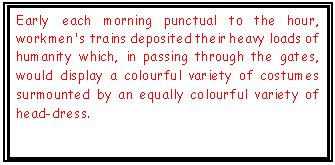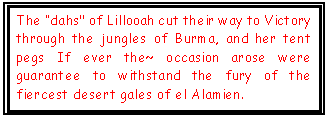|
In the year 1938, long before Dunkirk and Pearl Harbour, the C. & W. shops at Lillooah had little else of importance to attend to than the maintenance of a steady flow of vehicles for passenger and goods service over the 4,000 mile track of her Railway. Work then, though far from being slack, was not heavy a fact which may have been due to the keenness displayed by the workers in whatever jobs they were set. Early each
morning punctual to the hour, workmen ' s trains deposited their heavy
loads of humanity which, in passing through the gates, would display a
colourful variety of costumes surmounted by an equally colourful variety
of head-dress. In an incredibly short space of time,
With the siren at 4-30 in the afternoon, work would cease and the men
perhaps not quite as clean and colourful as before, would troop out and
board their respective home-bound trains. A perfectly peaceful everyday
routine
Then came 1939, Hitler decided it was time his "Master Race" ruled the Empire. Mussolini wanted a hand in the game too. Two years later Hirohito followed suit and the world was plunged into dismal chaos. And through the bitter years of bloodshed, suffering and tears d1at were to come, who would have dreamed that Lillooah -a mere speck on the universe was to play so vital and glorious a part in the achievement of final Victory.
With Japanese bases, but a few flying hours away, serious air raid precautions also had to be considered. Here too volunteers were whole-heartedly to the form. Blast walls sprang up overnight, shelters filled every available comer and water-troughs lay scattered at numerous vantage points. Fire practices and stirrup-pump drills were constant until cent percent efficiency was attained. A word of praise to Fire master Captain Harry James would not be out of place here. Due to his untiring and ceaseless efforts, the fire-fighters of Lillooah were second to none in the whole area.
Lillooah's war time activities however did not end with her all-out effort to supply adequate railroad means of transport. The building of other vehicular bodies was undertaken, and hundreds upon hundreds of ambulances, water-cars, tanks and lorries passed incessantly out of the gates. Other minor jobs of major wartime importance were heavy orders for
"dahs" and tent pegs. These were accurately complied with and rushed away
for service to distant theatres of war.
But now peace has come to the world once again. The colourful costumes of pre-war days are taking the place of wartime khaki and colourful variety of head-dress replacing the forage-cap but there can never be anything as colourful as the story of Lillooah's punch during the war. |
 these crowds would disappear, the gates would close,
and dense black clouds of smoke from chimney-tops would signal the
commencement of yet another day of work.
these crowds would disappear, the gates would close,
and dense black clouds of smoke from chimney-tops would signal the
commencement of yet another day of work.